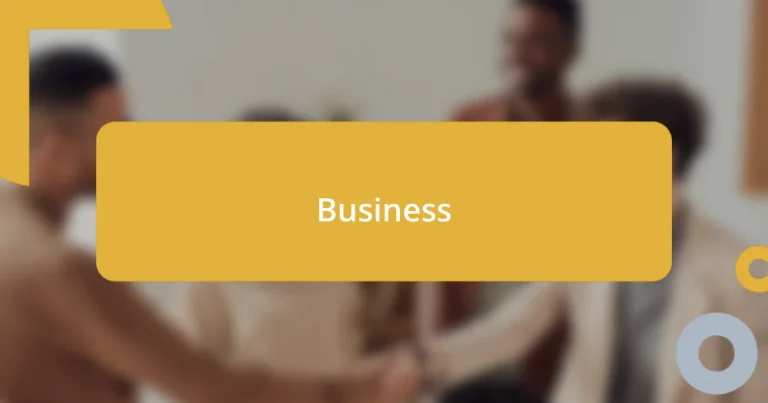Key takeaways:
- Utilize the SMART criteria to set clear, measurable, and relevant goals, and periodically reassess them to remain aligned with your personal journey.
- Choose documentation tools that fit your workflow and support collaboration, ensuring they meet your specific needs for tracking and analysis.
- Sharing progress with others fosters accountability, motivation, and valuable insights, creating a supportive community that enhances personal growth.
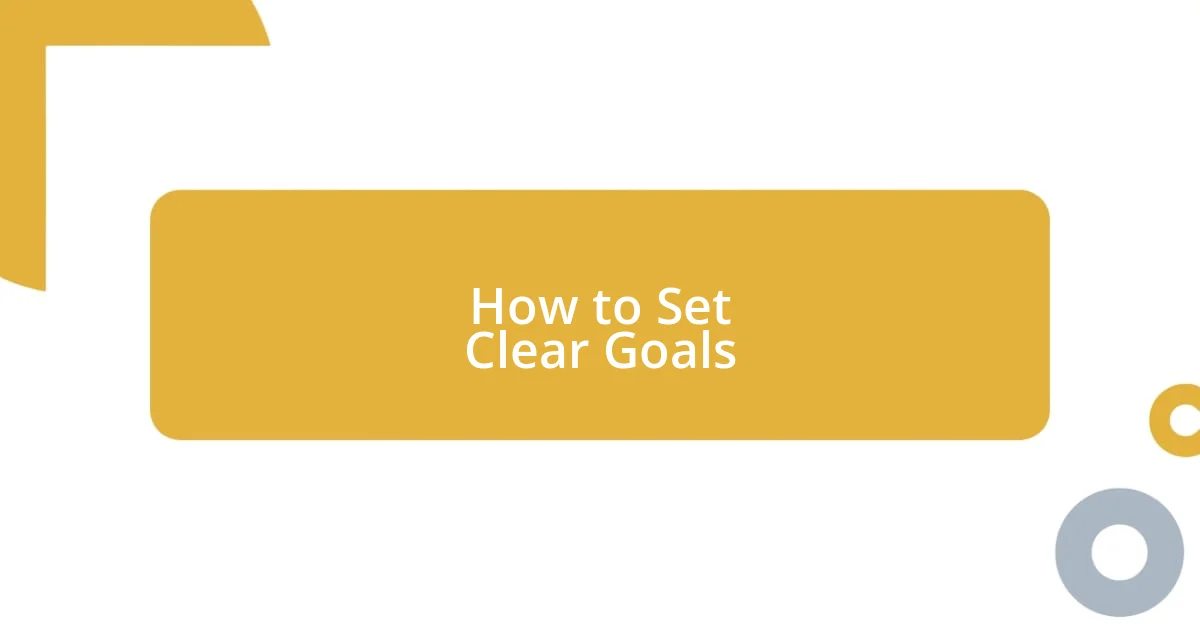
How to Set Clear Goals
Setting clear goals is like having a roadmap for your journey; it gives you direction and clarity. When I first started my pursuit of personal development, I remember writing down my goals on a sticky note and sticking it to my desk. It’s striking how seeing those words every day kept me focused and motivated—have you ever tried that?
One approach that really helped me was the SMART criteria, which stands for Specific, Measurable, Achievable, Relevant, and Time-bound. For instance, instead of saying, “I want to get fit,” I rephrased it to “I will run three times a week for 30 minutes over the next two months.” This tiny shift made a world of difference in how I tracked my progress and celebrated small victories. Have you thought about how much easier it is to stay motivated with measurable goals?
I’ve also learned that it’s important to periodically revisit and revise my goals based on my journey so far. I once set a goal that felt liberating but later became overwhelming. When I took a step back and adjusted it to fit my evolving life, I felt a wave of relief. Reflecting on your goals regularly can help ensure they remain relevant to your path—what goals have you reassessed recently?
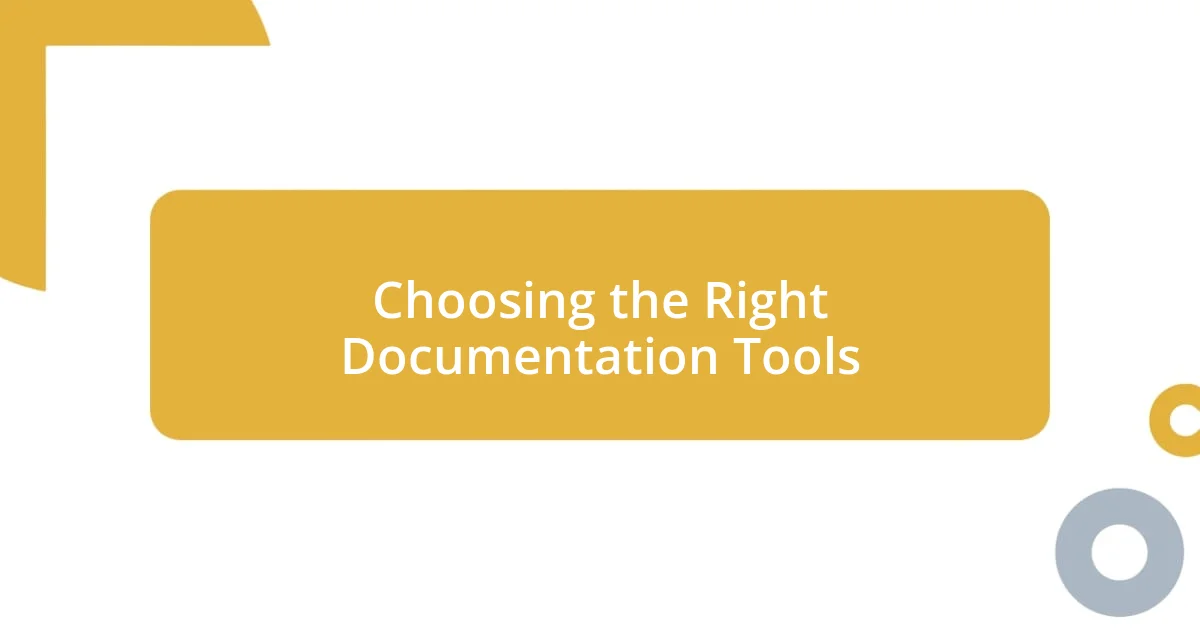
Choosing the Right Documentation Tools
Choosing the right documentation tools can feel like a daunting task, especially with so many options available. I recall when I was selecting my first tool; it was a bit overwhelming! After some trial and error, I found that tools like Notion and Trello suited my needs best because of their versatility and user-friendly interfaces. What types have you experimented with?
It’s essential to consider how a tool fits into your workflow. For instance, I love tools that integrate seamlessly with my existing processes. When I began using Google Docs for documentation, I appreciated the collaborative features that allowed me to get instant feedback. Have you tried a tool that made collaboration easier for your progress tracking?
Taking into account the purpose of your documentation is vital. If you’re looking for detailed analysis, tools like Evernote may serve you well with their tagging and search capabilities. Conversely, for straightforward task tracking, simpler platforms like Todoist might suffice. Finding that balance between functionality and simplicity has been crucial in my journey. So, what functionality do you think is crucial for your documentation?
| Tool | Best For |
|---|---|
| Notion | Versatility and organization |
| Trello | Task management and visual tracking |
| Google Docs | Collaboration and ease of access |
| Evernote | Detailed documentation and searching |
| Todoist | Simplicity in task tracking |
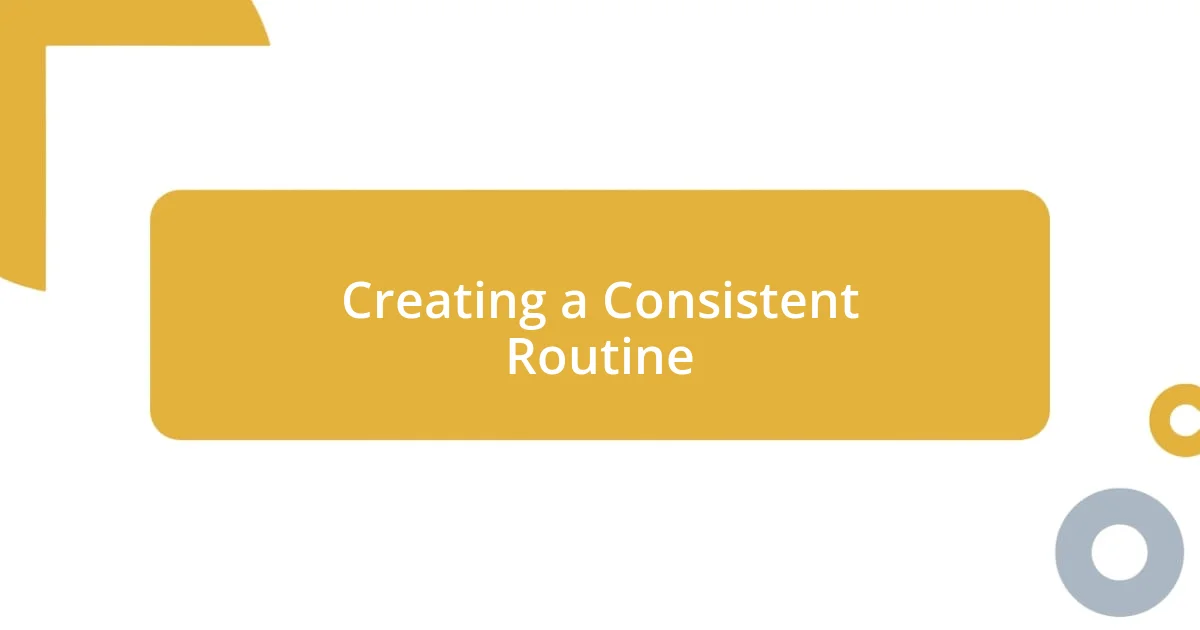
Creating a Consistent Routine
Establishing a consistent routine is foundational for tracking progress effectively. Personally, I’ve noticed that setting my goals at the same time every day helps create a rhythm in my life that makes it easier to stick to them. I always wake up at the same hour, and believe me, the discipline I cultivated through this small habit translates into my goal-oriented tasks throughout the day. How do you integrate routine into your life?
To make your routine effective, consider these pointers:
- Set a specific time for your tasks: Decide when you will work on your goals each day to build anticipation.
- Start small: Incorporating manageable actions into your routine can create a sense of achievement without feeling overwhelming.
- Eliminate distractions: Designate a workspace that’s free of interruptions to foster focus.
- Track your successes: Celebrate small wins to motivate yourself and reinforce the value of your routine.
- Stay flexible: If something doesn’t work, don’t hesitate to tweak your routine until it feels right for you.
It’s fascinating how a simple change, like choosing a specific time for daily reflection, can shift your perspective. When I began journaling each evening over a cup of herbal tea, I felt this calming ritual solidify my thoughts and progress. I often find myself looking forward to those quiet moments where I can pause and reflect. How do you carve out moments for your progress?
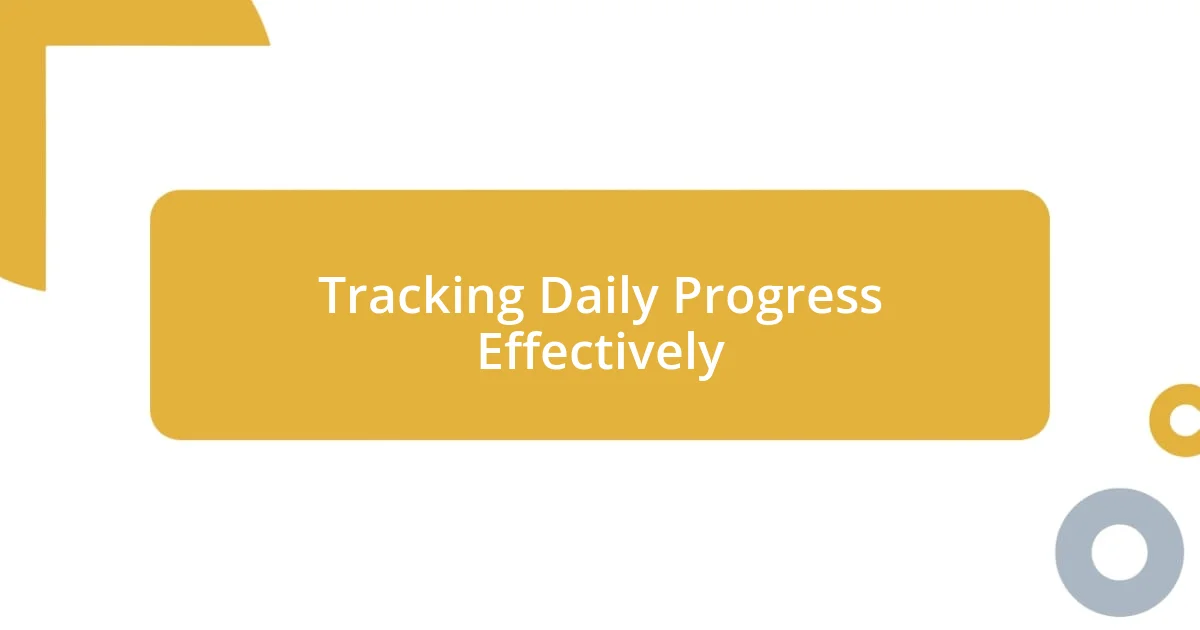
Tracking Daily Progress Effectively
Tracking daily progress effectively is all about creating meaningful connections with your actions. For me, I’ve found that jotting down my tasks in a simple notebook helps transform abstract goals into tangible steps I can visualize. There’s something satisfying about crossing off completed tasks; it doesn’t just mark progress, it ignites a sense of accomplishment that fuels my motivation. Have you experienced that invigorating rush of crossing off a task?
In my experience, a blend of quantitative and qualitative tracking enhances clarity. One method I use is placing a numerical value on my goals and then reflecting on them weekly. For example, I track the number of pages I read, but I also make a note about how I felt about the material. This dual approach has not only kept me on track but has also enriched my understanding and enjoyment of the process itself. How do you balance the metrics with your personal reflections?
I’ve also discovered that visual tracking can be a game changer. A habit tracker on my wall has turned my progress into a colorful tapestry of achievements and shortfalls. Whenever I see a blank square, it almost calls to me, pushing me to fill it with a vibrant mark of effort. I sometimes wonder, does seeing our progress visually alter our mindset about the effort we put in each day? For me, it definitely does—it creates a sense of competition with myself that I find invigorating. How would a visual representation of your daily progress motivate you?
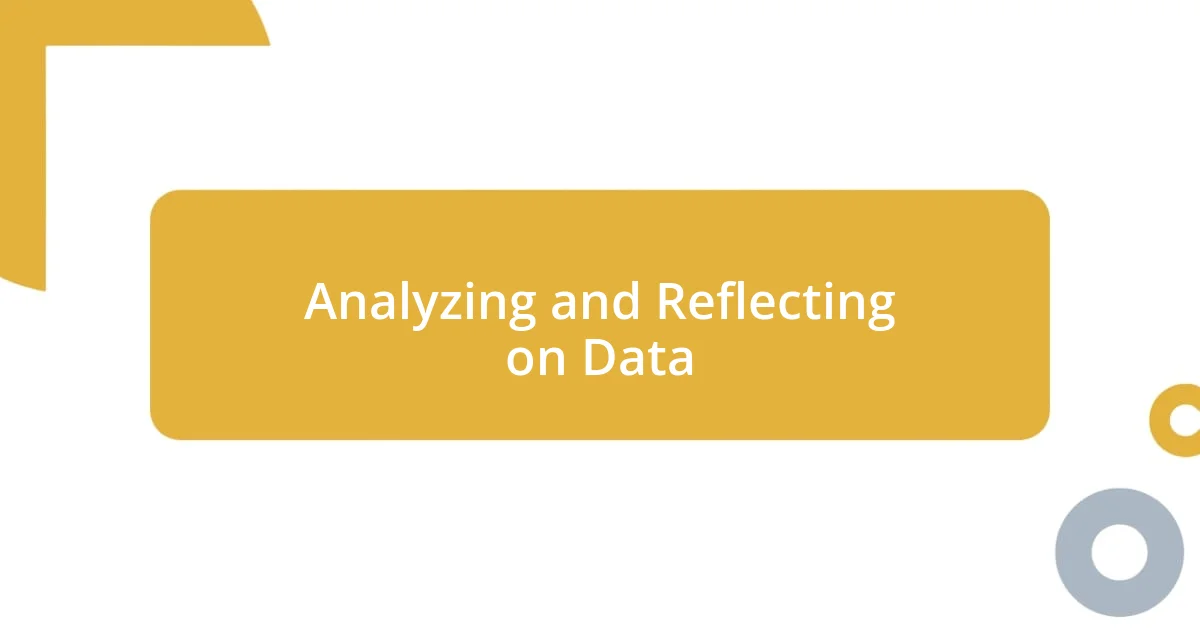
Analyzing and Reflecting on Data
Analyzing the data I collect is where the magic happens. I often set aside a dedicated time each week to deeply dive into my notes and measurements. For instance, when I examined my reading habits, I noticed patterns that I hadn’t recognized before, like how my mood influenced my reading speed. Isn’t it fascinating how understanding these nuances can change the way we approach our goals?
When reflecting on my progress, I try to ask myself meaningful questions. What did I learn from a recent setback? How did a small victory feel? This practice forces me to confront my emotions, which can be surprisingly enlightening. I remember feeling frustrated after a week of low productivity, but upon reflecting, I realized I had actually learned more about my personal limits. Isn’t it interesting how sometimes, the lessons we learn in the tough moments can be more valuable than the successes?
Data analysis isn’t just numbers to me; it’s a conversation with myself. Every chart or note represents a story, a moment in my journey. For example, after mapping out my weekly progress on a chart, I often feel a mix of pride and determination. This blend of emotions fuels my drive for the next week. Have you ever experienced that blend of reflection and motivation? For me, visualizing this journey helps transform every number into a step forward.
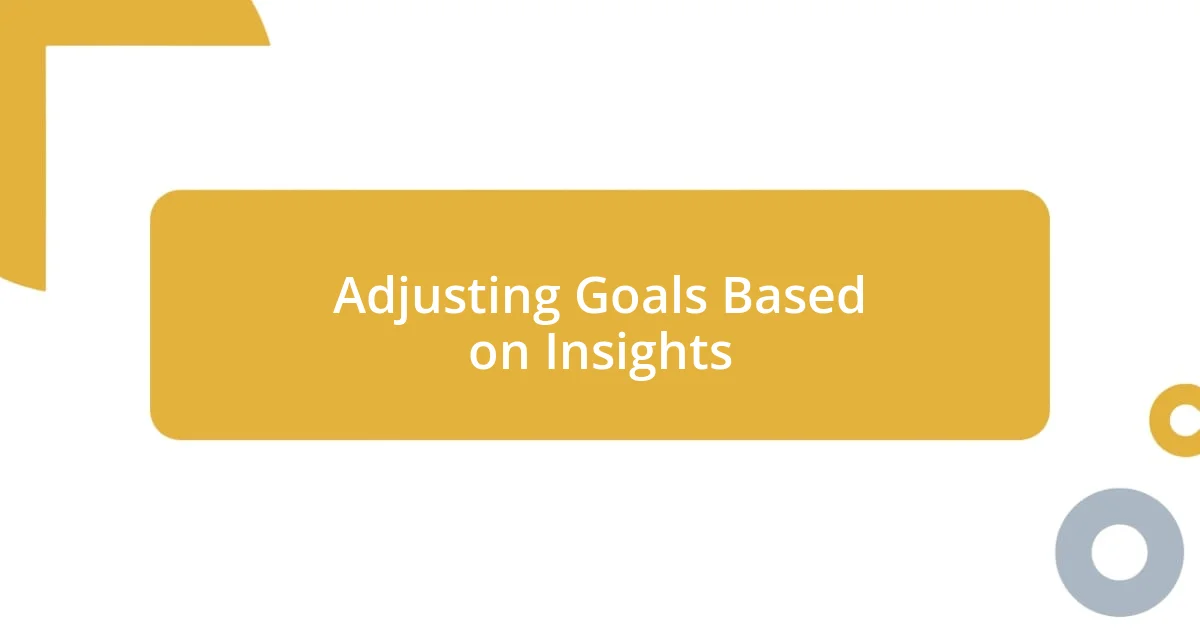
Adjusting Goals Based on Insights
Sometimes, I find that my initial goals simply don’t resonate as I gain insights from my progress. For instance, I once aimed to read a certain number of books each month, but as I recorded my feelings about each read, I realized that quality was far more fulfilling than quantity. Adjusting my goal to focus on exploring fewer, more impactful books has opened up new realms of understanding for me. Have you ever felt the need to shift your goals after realizing what truly matters to you?
Another insight I gained was the importance of being flexible with my timeline. Early on, I set rigid deadlines that often led to burnout. By adjusting my goals based on how I was feeling weekly, I learned to embrace a more organic pace. For example, I shifted my writing deadlines after recognizing days when creativity flowed more freely. This simple change made my work feel less like a chore and more like an inspiring journey. Isn’t it freeing to know that we can redefine our paths based on our personal rhythms?
Additionally, I’ve come to appreciate the role of collaboration in goal adjustment. A simple conversation with a friend about my reading list sparked a completely new direction for me. They introduced me to genres I had never considered, reminding me that sometimes an outside perspective can be the catalyst for growth. This experience reaffirmed my belief that adjusting goals rooted in shared insights not only broadens my horizons but also enriches my experiences. Have you had moments where others’ perspectives reshaped your aspirations?
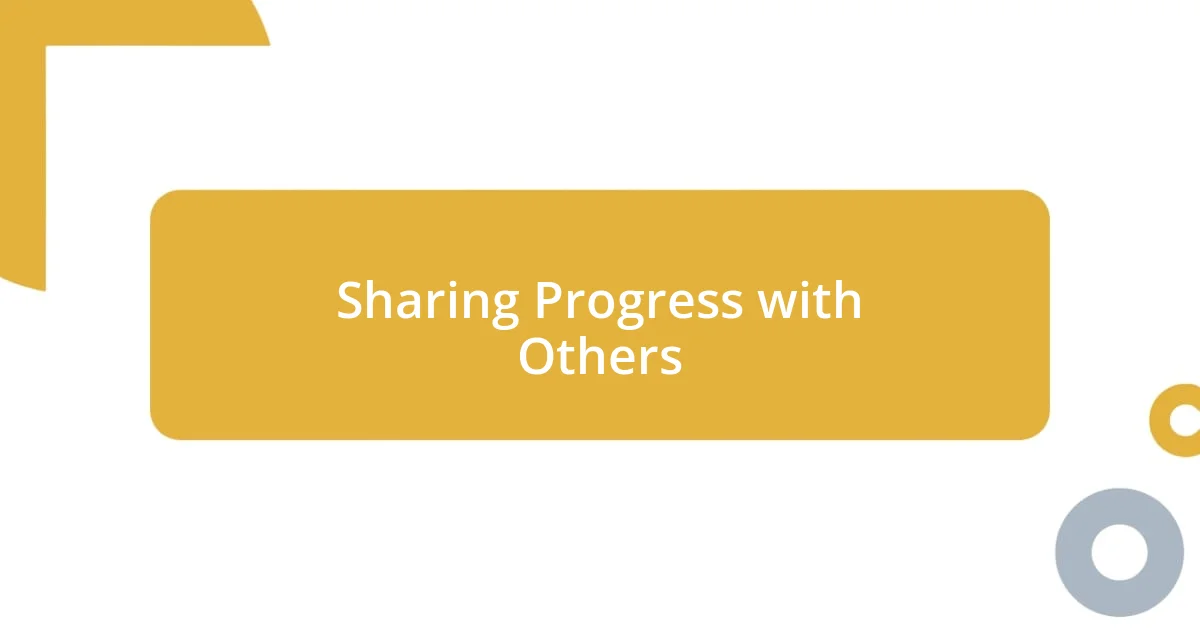
Sharing Progress with Others
When I share my progress with others, I find it not only helps me stay accountable but also opens the door for fascinating discussions. I remember the first time I shared my weekly goals with a close friend; their support and feedback pushed me to aim higher. Have you ever felt that surge of motivation when someone believes in your potential? It’s like a little spark that reignites my passion for my goals.
I also love documenting my journey on social media. I often post updates about my reading challenges or writing milestones, and the responses I get can be incredibly uplifting. One time, after I posted about finishing a challenging book, several followers reached out to share their experiences with similar texts. It reminded me that while my journey is personal, the community aspect makes it richer and more real. Isn’t it beautiful how sharing can create a sense of belonging?
Additionally, discussing my progress in an online forum has added another layer to my growth. When I described my struggle with balancing work and passion projects, several members offered valuable strategies that transformed my approach. This exchange made me realize that vulnerability can lead to powerful connections. Have you found that sharing your challenges invited others to open up as well? It’s in these moments of shared experience that I truly feel we can grow together, learning more than we ever could alone.












